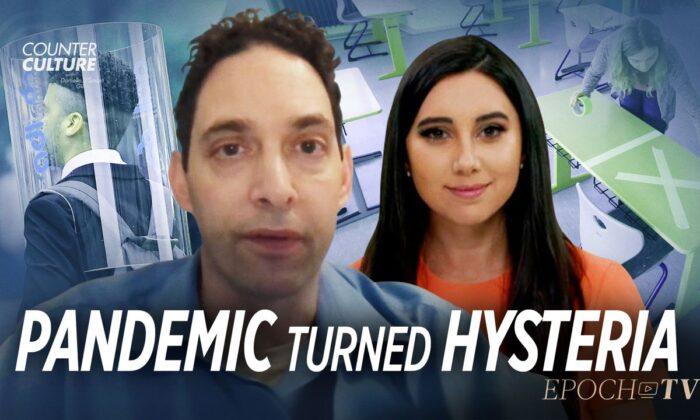There is an old saying, courtesy of the French, that for decades held true in American politics. If you’re not a liberal when you’re 25, you have no heart. If you’re not a conservative when you’re 35, you have no head. Distressingly, this phrase has become far less accurate in the last 10 to 15 years as Millennials increasingly have failed to grow out of their liberal ideas (many of which are now patently illiberal), while the Generation Z population has been raised to believe progressive policies are synonymous with liberalism, which couldn’t be further from the truth. Even more distressing is just how many members of our youngest generations report they’d be willing to vote for a socialist candidate, arguing with a straight face that socialism has just never been done “the right way.”
Zegers is only 24 years old and an excellent example of the kinds of advocates conservatives need when battling the entrenched systems in our country that have been quietly (and not so quietly) promoting socialism as a cure for what ails us. She is charismatic, intelligent, and able to connect the dots, from socialism to communism to death, in a way that is both engaging and empathetic. Much of the problem conservatives face in the culture war is combating the emotional appeals that progressives are so good at making and relying too much on logic to win their arguments. Though Zegers is definitely logical, she seems to understand the need to craft a narrative to win over her audience as well as the tactics the political left uses to win the hearts and enslave the minds of America’s youth long after they should have grown out of their blind idealism.
Philipp and Zegers begin their discussion with the pushback against the communist government going on in Cuba, which the American media has glibly hand-waved away as being the result of U.S. embargos. Zegers is quick to tie the protests in Cuba, and more importantly a fundamental lack of understanding about what socialism actually is, to the rise of pro-socialist sympathies among the younger generations. She states—correctly—that Millennials and Gen Zers don’t see the same red flags with socialist ideologies that members of Generation X, the Baby Boomers, or the Silent Generation notice immediately, and as Philipp says, that’s largely due to their belief that socialism hasn’t been implemented properly. Millennials and Gen Zers see the economic collapse and mass poverty and starvation in socialist countries as flaws in socialism’s execution rather than a function of its design. They argue that it would work in the United States because we’d put the “right” people in office, having apparently never heard the phrase, “Absolute power corrupts absolutely.” This belief reveals the kind of perpetual childhood many Millennials seem to be trapped in, with Gen Zers following the same path, where they blindly and inexplicably trust government leaders to have their best interests at heart despite all indications to the contrary.
Zegers agrees that this is the crux of the issue, and believes that conservatives need to do a better job connecting the dots so young people understand how it is that the socialist policies themselves lead, again and again, to such disastrous outcomes and it’s not a matter of electing the wrong people. The common refrain of socialists is that they want the people to have power, but as Zegers explains, it is capitalism that allows for this, not socialism. Capitalism allows individuals to have control over their own destinies by enabling them to own property, start a business, pursue economic prosperity, and enjoy personal freedom. Socialism concentrates political power into the hands of a few, and in doing so gives those few complete control over the individuals. Under socialism, individuals are beholden to the state for every one of their needs, and thus subjected to the state’s will and whims.
Zegers then turns the table on Philipp, reversing the role of interviewer and interviewee by asking him his opinion of the almost incestuous relationship between corporate entities and the Biden administration. Socialist governments seize control of the means of production and force companies to exert their authority over the population and we can see that massive corporations with largely monopolistic powers are already freely implementing Biden’s woke agenda on everything from incorporating critical race theory into their corporate training to supporting gender ideology in their advertising. Philipp considers this a unique kind of socialism that has skipped a couple of steps and seems tailor-made to infect the United States’ economic system. Both he and Zegers find it baffling that young socialists, who claim they’re fighting evil corporate interests, can’t put two and two together to see that those evil corporate interests are already in bed with the government they want to expand. Zegers is trying to find ways to rebrand conservatism as the hip way to fight the system in order to tap into the youthful instinct to rebel, giving a shout-out to the late Patrick Swayze and the original cast of the 1980s anti-communist film “Red Dawn.”
Philipp circles back around to the way socialism does nothing to get rid of big business or giant factories, allowing Zegers to delve into some of the more disturbing practices that take place once the government owns all means of production and is the only source of employment. She dismantles the idea that Venezuela is a capitalist country, pointing out that while Venezuelan companies may technically be considered private entities, it’s only because government officials put their friends in charge of corporations. Again, this is something those on the right are well aware of, but Millennials and Gen Zers need it spelled out for them.
Philipp throws some facts at Zegers of which she wasn’t previously aware on the history of the kinds of sexual harassment and state-sanctioned rape that takes place in communist regimes, but she isn’t really surprised. Communists look at the human being as just more state property, so of course they would see women as a commodity. Zegers mentions the obsession the political left has with branding conservative women as victims of “The Handmaid’s Tale” while openly discussing their idea of a socialist utopia at conventions, where they champion tearing down the nuclear family in order to free women of the need to bear their own children, instead shifting that “burden” to surrogates. “The Handmaid’s Tale” is about women being forced to bear children for wealthy couples unable to have children of their own. The fact that there are members of the political left who are un-ironically pushing for this as a way to “liberate” women would be laughable if it weren’t so frightening.
Philipp likens this to China’s one-child (now two-child) policy, where the CCP not only carries out post-birth “abortions” but actively tracks women’s menstrual cycles, which allows Zegers an opportunity to talk about the battle to convince members of her generation that the CCP of today is the same CCP that massacred civilians in Tiananmen Square. She uses COVID-19 as a modern-day illustration of exactly how communist regimes lie and cover up wrongdoing, in this case to the detriment of the entire world.
Philipp mentions the mainstream media is running cover for both Cuba and China, deflecting the reasons for the Cuban protests and ignoring the protests in Hong Kong and how protesters have been “disappeared” rather than shot in the streets as they were at Tiananmen Square. Zegers is happy to criticize the media, who have dismissed criticism of China for causing a worldwide pandemic as xenophobic while praising how quickly their one-party rule got COVID-19 under control among the Chinese population. Setting aside the fact that we can’t actually trust anything that comes from the CCP, Zegers points out how often the media has praised socialist regimes in the past, from Hitler to Stalin, before things took a turn for the worse and they had to walk back their support. The New York Times has an especially poor track record when it comes to praising socialist and communist regimes, and it’s absurd that NYT is still referred to as the newspaper of record.
Zegers then missteps slightly in discussing children and public education. She’s right on target with parents having trusted the government to educate their children for too long, but she doesn’t seem to realize that parents across the country have already begun to wake up to the indoctrination happening at the K–12 level and are pulling their kids out of school in droves. It’s easy to forgive her for this, though, given her youth and how recently she escaped the university system with her conservatism intact. Her enthusiasm for parents taking a more active role in educating their children and her praise of outside-the-box thinking when it comes to teaching kids everything from basic finances to changing a tire is genuine, and her instincts are dead on in how to counteract the influence the government has over children via the public school system, so she gets a pass.
For the remainder of the episode, Philipp and Zegers bounce around in a lively discussion of topics from the destruction of religion in communist societies to the difference between self esteem and self worth, and how in order to spread socialism the first thing communists do is convince the population that there’s a (usually nonexistent) problem that only the government can solve. This obviously serves not only to divide the population but indoctrinate them with the idea that government is the only solution to large scale societal issues, like climate change. Zegers has the opportunity to discuss some of the ways children are now overtly indoctrinated into socialism in schools in ways they weren’t just a few years ago, and the attempts made by her alma mater to indoctrinate her as well, mentioning the “dang women’s studies” that the university tried to convince her to add as a minor. The interview closes where it started, on a discussion of Cuba, and the way the communists rose to power through promising to level the playing field between rich farmers and poor farmers by stealing the rich farmers’ livestock and giving it to the poor. These same kinds of promises are rebranded by members of the current Democratic Party in ways that sound too good for Millennials and Gen Zers to pass up, such as Elizabeth Warren’s college debt forgiveness calculator that was prominent on her website during her failed presidential campaign.
This half hour is well worth anyone’s time, regardless of how well versed they already are in socialist tactics and history. Zegers brings energy and optimism to a discussion that leaves many Boomers and Gen Xers feeling like the sky is falling, and restores a bit of faith that perhaps the younger generations can be turned around after all. If the political right can cultivate more speakers with Zegers’ charm, they’ll have a real shot at winning the political and cultural wars America now finds itself fighting. That alone makes this episode worth watching and sharing, particularly with anyone you know in the 18–40 demographic.




